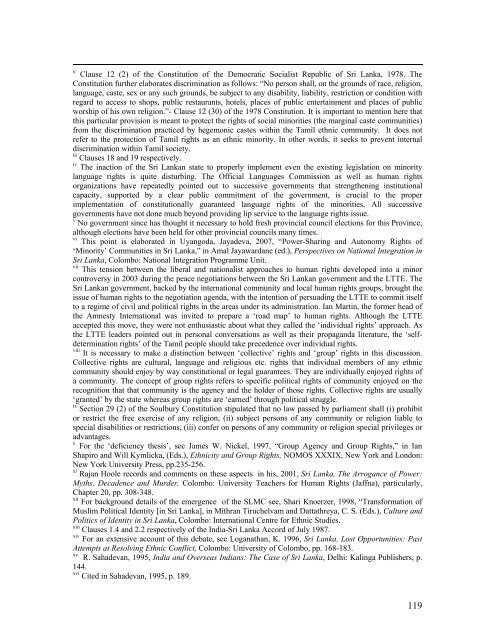Living on the Margins. Minorities in South Asia - EURAC
Living on the Margins. Minorities in South Asia - EURAC
Living on the Margins. Minorities in South Asia - EURAC
- TAGS
- minorities
- eurac
- www.eurac.edu
You also want an ePaper? Increase the reach of your titles
YUMPU automatically turns print PDFs into web optimized ePapers that Google loves.
ii<br />
Clause 12 (2) of <strong>the</strong> C<strong>on</strong>stituti<strong>on</strong> of <strong>the</strong> Democratic Socialist Republic of Sri Lanka, 1978. The<br />
C<strong>on</strong>stituti<strong>on</strong> fur<strong>the</strong>r elaborates discrim<strong>in</strong>ati<strong>on</strong> as follows: “No pers<strong>on</strong> shall, <strong>on</strong> <strong>the</strong> grounds of race, religi<strong>on</strong>,<br />
language, caste, sex or any such grounds, be subject to any disability, liability, restricti<strong>on</strong> or c<strong>on</strong>diti<strong>on</strong> with<br />
regard to access to shops, public restaurants, hotels, places of public enterta<strong>in</strong>ment and places of public<br />
worship of his own religi<strong>on</strong>.”- Clause 12 (30) of <strong>the</strong> 1978 C<strong>on</strong>stituti<strong>on</strong>. It is important to menti<strong>on</strong> here that<br />
this particular provisi<strong>on</strong> is meant to protect <strong>the</strong> rights of social m<strong>in</strong>orities (<strong>the</strong> marg<strong>in</strong>al caste communities)<br />
from <strong>the</strong> discrim<strong>in</strong>ati<strong>on</strong> practiced by hegem<strong>on</strong>ic castes with<strong>in</strong> <strong>the</strong> Tamil ethnic community. It does not<br />
refer to <strong>the</strong> protecti<strong>on</strong> of Tamil rights as an ethnic m<strong>in</strong>ority. In o<strong>the</strong>r words, it seeks to prevent <strong>in</strong>ternal<br />
discrim<strong>in</strong>ati<strong>on</strong> with<strong>in</strong> Tamil society.<br />
iii<br />
Clauses 18 and 19 respectively.<br />
iv<br />
The <strong>in</strong>acti<strong>on</strong> of <strong>the</strong> Sri Lankan state to properly implement even <strong>the</strong> exist<strong>in</strong>g legislati<strong>on</strong> <strong>on</strong> m<strong>in</strong>ority<br />
language rights is quite disturb<strong>in</strong>g. The Official Languages Commissi<strong>on</strong> as well as human rights<br />
organizati<strong>on</strong>s have repeatedly po<strong>in</strong>ted out to successive governments that streng<strong>the</strong>n<strong>in</strong>g <strong>in</strong>stituti<strong>on</strong>al<br />
capacity, supported by a clear public commitment of <strong>the</strong> government, is crucial to <strong>the</strong> proper<br />
implementati<strong>on</strong> of c<strong>on</strong>stituti<strong>on</strong>ally guaranteed language rights of <strong>the</strong> m<strong>in</strong>orities. All successive<br />
governments have not d<strong>on</strong>e much bey<strong>on</strong>d provid<strong>in</strong>g lip service to <strong>the</strong> language rights issue.<br />
v<br />
No government s<strong>in</strong>ce has thought it necessary to hold fresh prov<strong>in</strong>cial council electi<strong>on</strong>s for this Prov<strong>in</strong>ce,<br />
although electi<strong>on</strong>s have been held for o<strong>the</strong>r prov<strong>in</strong>cial councils many times.<br />
vi<br />
This po<strong>in</strong>t is elaborated <strong>in</strong> Uyangoda, Jayadeva, 2007, “Power-Shar<strong>in</strong>g and Aut<strong>on</strong>omy Rights of<br />
‘M<strong>in</strong>ority’ Communities <strong>in</strong> Sri Lanka,” <strong>in</strong> Amal Jayawardane (ed.), Perspectives <strong>on</strong> Nati<strong>on</strong>al Integrati<strong>on</strong> <strong>in</strong><br />
Sri Lanka, Colombo: Nati<strong>on</strong>al Integrati<strong>on</strong> Programme Unit.<br />
vii<br />
This tensi<strong>on</strong> between <strong>the</strong> liberal and nati<strong>on</strong>alist approaches to human rights developed <strong>in</strong>to a m<strong>in</strong>or<br />
c<strong>on</strong>troversy <strong>in</strong> 2003 dur<strong>in</strong>g <strong>the</strong> peace negotiati<strong>on</strong>s between <strong>the</strong> Sri Lankan government and <strong>the</strong> LTTE. The<br />
Sri Lankan government, backed by <strong>the</strong> <strong>in</strong>ternati<strong>on</strong>al community and local human rights groups, brought <strong>the</strong><br />
issue of human rights to <strong>the</strong> negotiati<strong>on</strong> agenda, with <strong>the</strong> <strong>in</strong>tenti<strong>on</strong> of persuad<strong>in</strong>g <strong>the</strong> LTTE to commit itself<br />
to a regime of civil and political rights <strong>in</strong> <strong>the</strong> areas under its adm<strong>in</strong>istrati<strong>on</strong>. Ian Mart<strong>in</strong>, <strong>the</strong> former head of<br />
<strong>the</strong> Amnesty Internati<strong>on</strong>al was <strong>in</strong>vited to prepare a ‘road map’ to human rights. Although <strong>the</strong> LTTE<br />
accepted this move, <strong>the</strong>y were not enthusiastic about what <strong>the</strong>y called <strong>the</strong> ‘<strong>in</strong>dividual rights’ approach. As<br />
<strong>the</strong> LTTE leaders po<strong>in</strong>ted out <strong>in</strong> pers<strong>on</strong>al c<strong>on</strong>versati<strong>on</strong>s as well as <strong>the</strong>ir propaganda literature, <strong>the</strong> ‘selfdeterm<strong>in</strong>ati<strong>on</strong><br />
rights’ of <strong>the</strong> Tamil people should take precedence over <strong>in</strong>dividual rights.<br />
viii<br />
It is necessary to make a dist<strong>in</strong>cti<strong>on</strong> between ‘collective’ rights and ‘group’ rights <strong>in</strong> this discussi<strong>on</strong>.<br />
Collective rights are cultural, language and religious etc. rights that <strong>in</strong>dividual members of any ethnic<br />
community should enjoy by way c<strong>on</strong>stituti<strong>on</strong>al or legal guarantees. They are <strong>in</strong>dividually enjoyed rights of<br />
a community. The c<strong>on</strong>cept of group rights refers to specific political rights of community enjoyed <strong>on</strong> <strong>the</strong><br />
recogniti<strong>on</strong> that that community is <strong>the</strong> agency and <strong>the</strong> holder of those rights. Collective rights are usually<br />
‘granted’ by <strong>the</strong> state whereas group rights are ‘earned’ through political struggle.<br />
ix<br />
Secti<strong>on</strong> 29 (2) of <strong>the</strong> Soulbury C<strong>on</strong>stituti<strong>on</strong> stipulated that no law passed by parliament shall (i) prohibit<br />
or restrict <strong>the</strong> free exercise of any religi<strong>on</strong>, (ii) subject pers<strong>on</strong>s of any community or religi<strong>on</strong> liable to<br />
special disabilities or restricti<strong>on</strong>s, (iii) c<strong>on</strong>fer <strong>on</strong> pers<strong>on</strong>s of any community or religi<strong>on</strong> special privileges or<br />
advantages.<br />
x<br />
For <strong>the</strong> ‘deficiency <strong>the</strong>sis’, see James W. Nickel, 1997, “Group Agency and Group Rights,” <strong>in</strong> Ian<br />
Shapiro and Will Kymlicka, (Eds.), Ethnicity and Group Rights, NOMOS XXXIX, New York and L<strong>on</strong>d<strong>on</strong>:<br />
New York University Press, pp.235-256.<br />
xi<br />
Rajan Hoole records and comments <strong>on</strong> <strong>the</strong>se aspects <strong>in</strong> his, 2001, Sri Lanka, The Arrogance of Power:<br />
Myths, Decadence and Murder, Colombo: University Teachers for Human Rights (Jaffna), particularly,<br />
Chapter 20, pp. 308-348.<br />
xii<br />
For background details of <strong>the</strong> emergence of <strong>the</strong> SLMC see, Shari Knoerzer, 1998, “Transformati<strong>on</strong> of<br />
Muslim Political Identity [<strong>in</strong> Sri Lanka], <strong>in</strong> Mithran Tiruchelvam and Dattathreya, C. S. (Eds.), Culture and<br />
Politics of Identity <strong>in</strong> Sri Lanka, Colombo: Internati<strong>on</strong>al Centre for Ethnic Studies.<br />
xiii<br />
Clauses 1.4 and 2.2 respectively of <strong>the</strong> India-Sri Lanka Accord of July 1987.<br />
xiv<br />
For an extensive account of this debate, see Loganathan, K. 1996, Sri Lanka, Lost Opportunities: Past<br />
Attempts at Resolv<strong>in</strong>g Ethnic C<strong>on</strong>flict, Colombo: University of Colombo, pp. 168-183.<br />
xv<br />
R. Sahadevan, 1995, India and Overseas Indians: The Case of Sri Lanka, Delhi: Kal<strong>in</strong>ga Publishers, p.<br />
144.<br />
xvi<br />
Cited <strong>in</strong> Sahadevan, 1995, p. 189.<br />
119

















